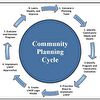An inclusive and thoughtful outcomes-focused strategic planning process will inform and define your UWSF initiative and help increase the impact of your efforts. United Way Worldwide has proposed six principles for Outcomes-Focused Planning that should guide the development of your work. These principles are:
- Base decisions on facts. Community planning is strongest when it is based on a solid understanding of existing research and a deep understanding of your community.
- Engage the right people for the purpose at hand. Community inclusiveness and the engagement of critical players will strengthen your process.
- Be specific about intended results/outcomes. Strong community work is organized around the specific results and outcomes that are desired within your community.
- Uncover underlying issues. To address complex issues, planners need to develop a deep understanding of underlying causes, issues, and dynamics.
- Aim for lasting community change. Strong community work is ambitious in its scope and desire to lead to significant community improvements.
- Measure, learn, improve, communicate. Evaluation and ongoing assessment are critical to continual learning and improvement.
The community planning model for UWSF is shown in Figure 1 below.
The community planning model is designed to encourage continual learning and improvement through the ongoing collection and utilization of information. The approach emphasizes the identification of family and community outcomes early in the process so the work is focused on changing community conditions. The steps in the process will sometimes overlap and as you progress through your UWSF implementation most will become cyclical. This is the beauty of the UWSF framework; you can apply the principles to whatever needs your community is facing at any given time.
Even though we have separated out the planning, implementing, and evaluating process, they are intricately interwoven when you put them into use.







